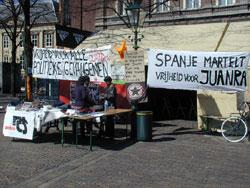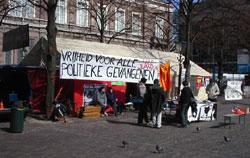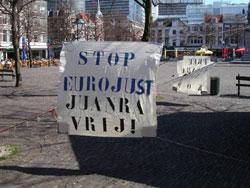Actieweek voor Juanra - Verslag dag 1
Free Juanra! - 08.04.2003 12:44
Vanochtend om 10.00u is de juanra-midweek begonnen. Er staat een grote tent op het plein met een expositie erin en meer info buiten voor de tent. Het ziet er goed uit.

free juanra!

free juanra!

free juanra!
Er is niet zoveel, maar wel regelmatig aanloop. 5 Basken, 1 Catalaan en 1 Nederlander zijn in hongerstaking uit solidariteit met Juanra en eisen zijn onmiddelijke vrijlating. Tijdens het flyeren op het binnenhof zijn we weggestuurd omdat er geen vergunning is.
Bij het Internationaal Gerechtshof is geprobeerd een aanklacht in te dienen tegen Aznar en Garcon wegens schending van de mensenrechten. Op het moment dat er twee mensen binnen waren de rest wilde volgen werden we tegengehouden door de security. Na een telefoontje bleek dat er spoedzitting was en niemand ons te woord kon staan. Er werd ons verzocht morgen om 10.00u terug te komen, misschien dat er dan iemand te spreken is. Wel is er nog geflyerd, maar meer mensen dan degenen die het gebouw ingingen/verlieten waren er nauwelijks. Persaandacht van vandaag bestond uit een paar fotografen en een live-interview met radio Amsterdam. Politici zijn nog niet gesignaleerd, smeris ook nauwelijks.
Nu het zonnetje weg is begint het aardig koud te worden. Dag 1 zit er bijna op.
Lees hieronder de aanklacht tegen Aznar en Garzon
Bringing Spain before the International Criminal Court !!
During the last years the Spanish state has been responsible for a wave of repression against its own citizens. The main target is the Basque independence movement, but various other social movements have also been targeted.
This repression is so systematic and widespread that it constitutes a crime as specified in the Rome Statute of the International Criminal Court, more specifically a Crime against Humanity. We therefore want the two main persons responsible to be brought before the Court.
The relevant articles are as follows:
Art. 7 (e): Torture:
the intentional infliction of severe pain or suffering, whether physical or mental, upon a person in the custody or under the control of the accused; except that torture shall not include pain or suffering arising only from, inherent in or incidental to, lawful sanctions
The widespread and systematic use of torture in Spain has been documented to great lengths by various international institutions and organizations. The UN Commission on Human Rights, the European Committee for the Prevention of Torture and Inhuman or Degrading Treatment or Punishment (CPT) and Amnesty International all have uttered sharp criticism of Spain. Most cases of torture occur during the so-called "Incommunicado" period, five days after an arrest when no contact with the outside world or legal counsel is allowed. Torture methods include electrical shock, beatings, sexual harassment and asphyxiation by putting a plastic bag over the head.
These methods are used against people suspected of 'political crimes', but increasingly also against migrants.
Art. 7 (f) Persecution:
Persecution against any identifiable group or collectivity on political, racial, national, ethnic, cultural, religious, gender as defined in paragraph 3, or other grounds that are universally recognized as impermissible under international law, in connection with any act referred to in this paragraph or any crime within the jurisdiction of the Court; "Persecution" means the intentional and severe deprivation of fundamental rights contrary to international law by reason of the identity of the group or collectivity.
In its offensive against the Basque population, Spain has outlawed various political organizations (Ekin, Jarrai, Batasuna, Segi, Haika), human rights groups (Gestoras, Askatasuna) and social groups (AEK, Joxemi Zulabe, Xaki). Also, three newspapers (Egin, Ardi Beltza, Egunkaria) were illegally shut down.
Furthermore, Spain has tried to take action against other social and political movements. It tried to declare legitimate democratic protests against EU policy and against globalization to be "terrorist".
This constitutes a severe and intentional deprivation of the fundamental human rights of freedom of expression and freedom of political association.
We therefore want the International Criminal Court to start proceedings against the two persons most responsible for these crimes:
- Jose Maria Aznar, Prime Minister of Spain, who instigated most of this and used his police force to commit these crimes.
- Baltasar Garzon, judge of the Audiencia Nacional (National Court), who provided the juridical framework for these crimes.
We are aware that the usual procedure at the International Criminal Court is that member states bring forth cases. However, most of us are either citizens of Spain (which is hardly likely to prosecute its own political leader) or other EU member states, which have important economic and political ties to Spain and will therefore also be hesitant.
That is why we ask the Prosecutor of the International Criminal Court to use the authority granted to him/her by the Rome Statute to take action against Spain.
 E-Mail: info@ freejuanra.org E-Mail: info@ freejuanra.org  Website: http://www.freejuanra.org Website: http://www.freejuanra.org
|




